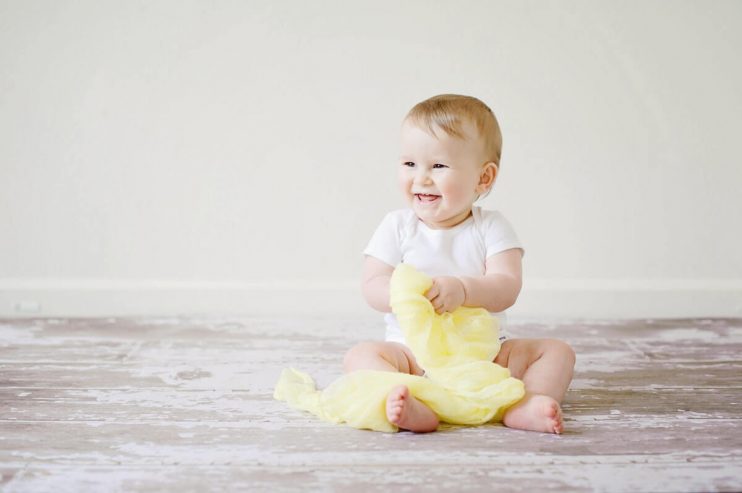We all know how important personal hygiene is, especially when it comes to oral health. When we don’t take care of our oral health, we start to have other health problems. That is why it is especially important to start teaching our children the importance of caring for their teeth at such a young age. Since being a parent is much more than diapers, we put together this mini guide on caring for your baby’s teeth!
When Do Babies Start Growing Teeth?
Typically, babies begin the process of growing teeth at four months; however, you can start to notice as early as three months old. Most babies develop their first tooth around six months. There are a variety of stages and different key points to understand.
First, around three months old, babies start to learn about their mouths, resulting in more saliva and more things put into their mouths. This does not necessarily mean they are teething. Some signs to indicate if your child may be teething includes fussiness, drooling, sore and swollen gums, chewing on things constantly, to name a few.
Usually, the two bottom front teeth are the first to come in followed by the two upper front teeth. Your child may begin to chew harder on a lot more items and be crankier. You will be able to see the gums are highly sensitive and may even swell.
After these primary teeth pop through, teeth surrounding the front teeth as well as the molars will start to appear. Similar symptoms may occur with a potential increase in them. Some babies will not want to eat and could get a fever or diarrhea. This period lasts from around ten months to 22 months.
When the child reaches two years old, the main molars will start to develop. This stage can bring the most pain to your child. Try to find a way to calm your baby and help them teeth as pain-free as possible.
When to Start Brushing Your Baby’s Teeth
You can start taking care of your baby’s teeth as soon as they are born! After they are eating, make sure to clean their gums with a washcloth gently. Never put a baby to sleep with a bottle, because they can increase their chances of having tooth decay. Avoid cleaning baby products with your mouth.
As soon as that first tooth pops up, you should begin to brush their teeth. During this stage, you do not need to use toothpaste, but use a toothbrush made for babies and clean the teeth they do have as well as massage their gums.
Regularly check their teeth to see if more teeth pop up, or if you start to notice some tooth decay. Schedule your baby’s dentist appointment before their first birthday. If you would like your baby to use fluoride and your water does not contain it, be sure to talk to your dentist to get some at around six months.
- Helps clean baby's teeth and massage gums
- Soft bristles gentle on sensitive gums and teeth
- No fluoride - safe to swallow
How to Brush Your Baby’s Teeth

It is crucial to have a toothbrush that is made for a child, with soft bristles. Between 6-12 months, no toothpaste is needed. If you wanted to use toothpaste, a slight rice-sized smear is recommended. As your child ages, more toothpaste becomes necessary. Brush your baby’s teeth twice a day, with plain water.
Between ages 2-5, a pea-sized amount of toothpaste is recommended for your child. Find a fluoride toothpaste made especially for babies to keep your little ones safe. Make sure to brush your child’s teeth twice a day like before. Teach your child early on not to swallow any toothpaste but to spit it all out. By age 6, they should be able to brush on their own.
Baby Brushing Tips
Some baby’s gums will be very sensitive, and they will not like their teeth brushed. Remember to be gentle and take it slowly. Watch for signs where they are hurting and try a smoother and a gentler approach. Do not force them to brush their teeth. You may have to try again at another time when they are more relaxed.
If your child has a hard time wanting to brush their teeth, make it a fun time for them! Try singing a song or having a fun colored toothbrush for them to use. Allow your child to try brushing their own teeth and playing with a toothbrush. This will show them that it is not a scary or hard thing to do. Finally, it is essential to lead by example. Brush your teeth with them to show them how important it truly is to brush their teeth!
- Establish good oral hygiene with the super-soft bristles on the infant-to-toddler toothbrush.
- The cute giraffe is made of durable yet soft material that's gentle on sensitive mouths, while the comfort-grip handle is easy for little hands to hold.
- Just add a pea-sized drop of Dr. Brown's natural baby toothpaste - it's Fluoride-free and safe to swallow for a wholesome way to teach baby good oral hygiene.
- QUICK CLEAN: Triple-angle silicone double-sided brush cleans and massages all sides of the teeth and gums at once. Great for babies teething.
- GLIDE AND GUIDE: Glide brush along the gum line to clean and massage and give baby relief.
- HABIT FORMING: Helps train and develop good oral hygiene habits for babies and infants.
- Fun way to encourage good oral care habits early on
- Extra soft bristles for effective and gentle cleaning
- Small toothbrush head for child's little mouth





